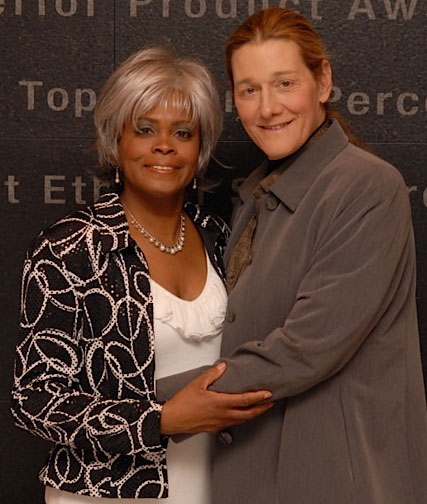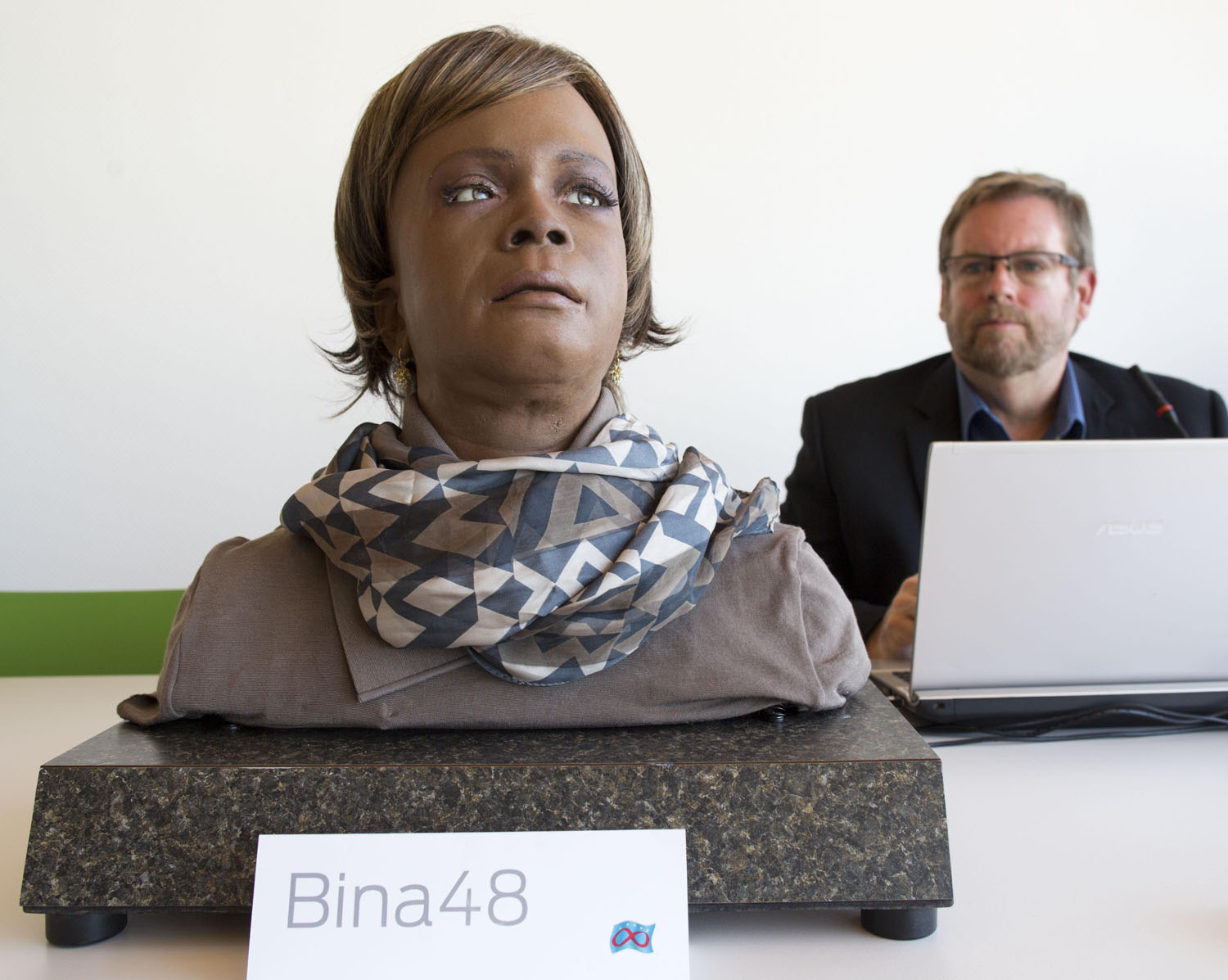
In the backyard of a cottage here overlooking the water, two poles with metal slats shaped like ribcages jut out from the ground. They look indistinguishable from heat lamps or fancy light fixtures.
These are satellite dishes, but they aren’t for TV. They’re meant for dispatching “mindfiles,” the memories, thoughts and feelings of people who wish to create digital copies of themselves and fling them into space with the belief that they’ll eventually reach some benevolent alien species.
Welcome to the future. Hope you don’t mind E.T. leafing through your diary.
The beach house and the backyard and the memory satellites are managed by 31-year-old Gabriel Rothblatt, a pastor of Terasem, a new sort of religion seeking answers to very old kinds of questions, all with an abiding faith in the transformative power of technology.
Beneath the cottage is a basement office where the mindfile operation is headquartered. Next door is an ashram, an airy glass building with walls that slide away to reveal a backyard home to a telescope for stargazing and a space to practice yoga. Tucked behind a shroud of greenery, most neighbors don’t even know this house of worship exists.
“Technology does feel and smell and look and act like a God."
The name Terasem comes from the Greek word for “Earthseed,” which is also the name for the futuristic religion found in the Octavia Butler sci-fi novel Parable of the Sower that helped inspire Gabriel’s parents, Bina and Martine Rothblatt, to start their new faith. Martine founded the successful satellite radio company Sirius XM in 1990. (Martine was originally known as Martin. She had sex reassignment surgery 20 years ago.)
Organized around four core tenets—“life is purposeful, death is optional, God is technological and love is essential”–Terasem is a “transreligion,” meaning that you don’t have to give up being Christian or Jewish or Muslim to join. In fact, many believers embrace traditional positions held by mainstream religions—including the omnipotence of God and the existence of an afterlife—but say these are made possible by increasing advancements in science and technology.
“Einstein said science without religion is lame. Religion without science is blind,” Martine Rothblatt tells TIME. “Bina and I were inspired to find a way for people to believe in God consistent with science and technology so people would have faith in the future.”
Sure, it’s easy to dismiss people who think they can somehow cheat death with a laptop. But Terasem is a potent symbol of a modern way of life where the digital world and the emotional one have become increasingly entwined. It is also a sign, if one from the fringe, of the always evolving relationship between technology and faith. Survey after survey has shown the number of Americans calling themselves “religious” has declined despite the fact that many still identify as “spiritual.” People are searching, and no longer do they look to technology to provide mere order for their lives. They also want meaning. Maybe, it’s time to hack our souls.
DIGITAL SCRAPBOOKING
While there may seem nothing so new-fangled as thousands of people broadcasting their innermost thoughts to outer space, technology has always played a role in shaping religious practice and belief.
“Technology does feel and smell and look and act like a God, at least sometimes,” says John Modern, a Professor of Religious Studies at Franklin & Marshall College. “So it’s certainly logical that someone would see the power of technology and locate their faith in it.”
Some believers in Terasem are motivated by a longing similar to one shared by followers of more familiar faiths–a desire to be reunited with people who have passed. Linda Chamberlain, cofounder of the cryonics company Alcor Life Extension Foundation and an active Terasemian, anticipates that one day in the future she’ll be reanimated alongside her husband Fred, who passed away a few years ago, and they can explore space together. Giulio Prisco, an Italian physicist who practices Terasem, says he hopes he’ll finally be reunited with his mother.
Though from the outside Terasem might look a little kooky, some ideas at its center resonate with Silicon Valley’s mainstream where millions of dollars are being spent to research how technology can alter the end of life and beyond. People like Google’s Larry Page and PayPal cofounder Peter Thiel are investing in projects focused on life extension and rejuvenation.

Portraits on the wall of Terasem’s Florida headquarters show people who have attended the organization’s meetings in the past, some of whom are among the tech industry’s most radical thinkers. Marvin Minsky, who helped start MIT’s artificial intelligence lab, is there. So is Google engineer Ray Kurzweil, one of the world’s most prominent proponents of transhumanism, an intellectual movement that shaped Terasem and animates many avant garde ideas in Silicon Valley.
Born nearly a century ago with a spike in popularity in the 1990s, transhumanism advocates for the ethical use of technology to transcend biology and enhance humanity’s physical and intellectual abilities. Google Glass, artificial limbs—even birth control, as one transhumanist told me—are ways in which we can harness technology to upgrade our biology. And one day, if the mindfile system works the way it’s supposed to, we just might be able to leave our physical bodies behind and transmit our brains into computerized vessels.
Johnny Depp puts a face, or at least a voice, to that far-out vision with the release of Transcendence Friday. Depp plays a terminally ill artificial intelligence researcher who uploads his consciousness into a computer, a plot that will land many of the ideas behind Terasem in movie theaters around the world.
“Some folks have seen this coming for 40 or 50 years,” says director Wally Pfister, who won an Oscar as the cinematographer for Christopher Nolan’s mind-bender Inception. “The moment they saw the power of computing they said, ‘Okay, at a certain point this is going to get to the point where we can either transcend the human mind or merge the human mind or build it into something greater, and that’s fascinating.”
The ability to control the universe like some sort of galaxy genie probably isn’t going to happen no matter how many times you watch The Matrix, and even if it does, it’s not going to be any time soon. But though the majority of transhumanists identify as atheists or agnostics, some have flocked to new religions like Terasem, which satisfy a yen for a spiritual sustenance in people whose lives are increasingly devoted to technology.
Terasem counts its Florida cottage and a solar-powered cabin in Lincoln, Vermont as its primary homes. It’s in Vermont that the Rothblatts keep a robot named BINA48. The machine is modeled after Martine’s wife, Bina, and was built to see just how precisely a robot loaded with mindfiles can resemble a living, breathing human being.

Terasem’s followers are dedicated to studying and raising awareness about what they call “personal cyberconciousness”—the creation of mindfiles. They believe that by ritualistically recording your thoughts and feelings with great detail, you can ultimately assemble a digital copy of yourself, available for future use.
To start, you write down or record a video of you talking about a thought, memory or feeling, and upload it to a website. You can also choose to have each mindfile beamed out into the universe—hence the satellites. So far more than 32,000 people have created free mindfile accounts.
The mindfiles are stored on servers located in both Vermont and Florida, and by using Terasem’s services you accept their promise that they will protect those files for the long-term future, making it possible for some not-yet-invented software to organize those files into an approximation of your consciousness so they can be uploaded into an artificial body 50, 100, 500 years from now.
“A lot of people have problems digesting” the idea, Gabriel says. “Instead of saying ‘mindfiling,’ I say ‘digital scrapbooking.”
The basement of the Terasem Movement Inc. cottage is the heart of its CyBeRev project, housing servers where users’ files are stored and the desk of a full-time programmer who keeps the shop up and running.
The cottage is also where Lori Rhodes, who helps run Terasem Movement Inc., the group’s educational non-profit, and Nikki Knudsen, Terasem’s financial manager, have their offices. The irony that people who smoke cigarettes make up a significant part of the staff for a movement dedicated to life extension isn’t lost on them.
Both Knudsen and Rhodes came to Terasem by happenstance: Knudsen, 38, was introduced through Rhodes’ sister, and Rhodes, 51, who had previously worked as a paralegal, found Terasem in 2005 through an online job advertisement for a compliance manager.
“Most people say, ‘Oh, it looks like a cult,’” Rhodes says. “My older sister did. When she first looked at it, she told me, ‘Don’t work for that organization. It looks like a cult and you’ll be blacklisted in the legal community.”
“But any religion starts with just a few members,” Rhodes says. “And I guess organized religion is cultish.”
ON THE CAMPAIGN TRAIL
Until 2011, Gabriel was a manager at a local pizza restaurant. Now, he spends most of his time running for Congress in a longshot campaign to get on the Democratic ballot to challenge Rep. Bill Posey this fall.
One afternoon this winter, Gabriel set up a small table advertising his candidacy at a home and garden expo. The crowd was made up of mostly white, upper-middle class baby boomers searching for the perfect garden hose or a nice new backsplash for their freshly renovated kitchen.
In a district that went 59 percent for Posey, a Republican, in 2012, Gabriel’s status as a Democrat may be just as much a stumbling block as Terasem. “He’s probably for Obamacare,” said one man as he walked by Gabriel’s table.
“When we can joyfully all experience techno immortality, then God is complete."
“My opponent has already begun using Terasem against me,” Gabriel tells me one night over dinner about Corry Westbrook, a former legislative director for the National Wildlife Foundation. “She says I’m inexperienced and bizarre…that I’m part of a cult.” Later, after giving me a tour of the ashram, he says that Westbrook has taken to telling people he “worships computers.” (Westbrook did not return requests for comment.)
Though one of Terasem’s core tenets is “God is technological,” Gabriel insists that’s not to be taken literally—instead, it’s meant to convey the notion that the way that you envision God directly influences your life.
It’s not exactly difficult to see how someone could misinterpret a bold statement like “God is technological.” It just sounds kind of nuts. Plus, a religion governed by a zealous devotion to technology is bound to attract critics.
Rhodes puts it more bluntly: “Some people call it the rapture of the nerds.”
“For us God is in-the-making by our collective efforts to make technology ever more omnipresent, omnipotent and ethical,” Martine says. “When we can joyfully all experience techno immortality, then God is complete.” (Martine, who rarely speaks to the press, answered questions sent by e-mail.)
When you possess this amount of reverence—and, yes, faith—in the power of science, it starts to mirror religious belief, particularly when the possibilities you believe future technologies will have—like omnipotence and the ability to resurrect the dead—are similar to ones mainstream religions ascribe to God. This is how technology becomes religion, and how God becomes a computer.
Now, in 2014, technology can do almost everything for us—alleviate loneliness, send taxis and hairstylists and groceries to our doorstep, even make people resigned to a life of silence hear again—but it can’t bring the people we love back from the beyond.
At least, the Terasemians say, not yet.
Correction: The original version of this story misstated the ownership of the Melbourne Beach home where the Terasem movement operates.
More Must-Reads from TIME
- Cybersecurity Experts Are Sounding the Alarm on DOGE
- Meet the 2025 Women of the Year
- The Harsh Truth About Disability Inclusion
- Why Do More Young Adults Have Cancer?
- Colman Domingo Leads With Radical Love
- How to Get Better at Doing Things Alone
- Michelle Zauner Stares Down the Darkness
Contact us at letters@time.com